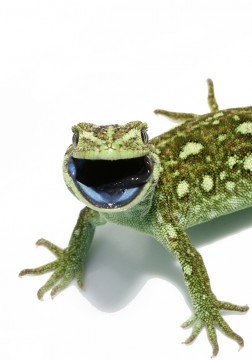Communicating Nature’s Importance: an Ongoing Challenge
Our new book, Vanishing Nature, has a lot to say about biodiversity loss in New Zealand and plenty of potential solutions to this ongoing and increasingly dire situation. New Zealand’s natural heritage is globally important, underpins our economy and society and makes up so much of our national identity.

Naultinus tuberculatus (Photo by Trent Bell)
So why has it been slowly sliding into oblivion as a result of the impacts of pests, habitat clearance and other drivers? We have established a national agency to carry out conservation work, given councils more mandate to do the same on their land and increasingly controlled activities on private land that would have resulted in further damage.
Thousands of volunteer groups labour all across the country – planting, trapping, clearing and monitoring their hearts out. The private and philanthropic sectors give tens of millions a year to help out and the country’s few hard-working NGOs like Forest & Bird develop on the ground programmes while carrying out crucial strategic advocacy. There have been some successes, but the overall picture remains one of decline.
All that we are doing is patently not enough… because habitat clearance continues, pests continue to devastate our flora and fauna and even the most well-known of our charismatic megafauna post population declines year after year.
So why are we struggling and losing the war?
We think it’s because the things we think are problems, are really symptoms. Symptoms of market failure, with biodiversity routinely excluded from decision-making. Symptoms of the power of private interests, hell-bent on reducing compliance costs and regulatory burdens for those that extract nature for their own gain. And symptoms of the failure of (all of us really) to acknowledge just how dependent we are on the natural world and how much its degradation will affect us both now and in the future. It’s this final point I’d like to focus on.
You’d think we’d have figured it out by now…
But the truth is, that it is hard to communicate the value of biodiversity to the individual. The recent Freshwater Reforms in New Zealand demonstrate that the best way to ensure all parties will participate is to put at stake access to a resource on which they directly rely. The ability to abstract from a stream to irrigate your dryland farm is one thing; taking the same interest in the fate of a freshwater fish species that calls your water source home is somewhat more remote to most.
Helping kiwis recognise just what a stake they have in effectively safeguarding the environment is an ongoing challenge.
But it is one we must meet through sound scientific research in our universities and crown research institutes that is communicated coherently across a range of forums; through effective use of social media to message conservation in a way that connects with people; through effective advocacy by joined-up NGOs and community groups; and using the full range of communication modes available to us in this modern era.
Mobilising the public to support nature conservation will challenge us all, but remains a critical task if we are to protect what matters.
